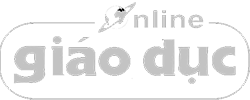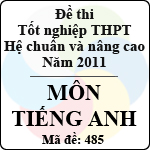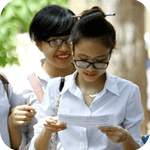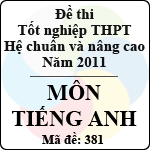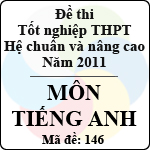Đề thi tốt nghiệp THPT năm 2011 hệ chuẩn và nâng cao – môn tiếng Anh (Mã đề 485), Đề thi tốt nghiệp THPT năm 2011 hệ chuẩn và nâng cao – môn tiếng Anh (Mã đề 485)
| BỘ GIÁO DỤC VÀ ĐÀO TẠO
(Đề thi chính thức) |
KỲ THI TỐT NGHIỆP TRUNG HỌC PHỔ THÔNG NĂM 2011 Thời gian làm bài: 60 phút, không kể thời gian giao đề Mã đề thi: 485 |
Read the following passage adapted from Pre-Essence Reading 1 by Rachel Lee, and mark the letter A, B, C, or D on your answer sheet to indicate the correct answer to each of the questions from 1 to 5.
BODY LANGUAGE AND CULTURAL DIFFERENCES
The body language people use often communicates more about their feelings than the words they are saying. We use body movements, hand gestures, facial expressions, and changes in our voice to communicate with each other. Although some body language is universal, many gestures are culturally specific and may mean different things in different countries.
If you want to give someone the nod in Bulgaria, you have to nod your head to say no and shake it to say yes – the exact opposite of what we do! In Belgium, pointing with your index finger or snapping your fingers at someone is very rude.
In France, you shouldn’t rest your feet on tables or chairs. Speaking to someone with your hands in your pockets will only make matters worse. In the Middle East, you should never show the soles of your feet or shoes to others as it will be seen as a grave insult. When eating, only use your right hand because they use their left hands when going to the bathroom.
In Bangladesh, the ‘thumbs-up’ is a rude sign. In Myanmar, people greet each other by clapping, and in India, whistling in public is considered rude.
In Japan, you should not blow your nose in public, but you can burp at the end of a meal to show that you have enjoyed it. The ‘OK’ sign (thumb and index finger forming a circle) means ‘everything is good’ in the West, but in China it means nothing or zero. In Japan, it means money, and in the Middle East, it is a rude gesture.
Question 1: It is mentioned in the passage that many gestures ______.
A. are not used to communicate our feelings
B. may mean different things in different countries
C. are used in greeting among men and women
D. can be used to greet each other in public
Question 2: People nod their head to say no in ______.
A. France B. Bulgaria C. Japan D. Belgium
Question 3: In the Middle East, people do not use their left hands for eating because they use their left hands ______.
A. when going to the bathroom
B. when preparing the meal
C. to clean their tables and chairs
D. to put in their pockets
Question 4: Which of the following is NOT true according to the passage?
A. In China, the ‘OK’ sign means money.
B. In Belgium, snapping your fingers at someone is very rude.
C. In France, people shouldn’t rest their feet on tables.
D. In Myanmar, people greet each other by clapping.
Question 5: The word “others” in paragraph 3 refers to ______.
A. other soles B. other people C. other feet D. other shoes
Mark the letter A, B, C, or D on your answer sheet to show the underlined part that needs correction.
Question 6: On Saturday, I enjoy to go to the concert with my friends.
A B C D
Question 7: Many species of wild animals would become extinction if people continued to cut down forests.
A B C D
Question 8: Some bacteria are extremely harmful, but others are regular used in producing foods.
A B C D
Question 9: It is suggested that smoking should to be banned in pubs, restaurants, and other public places.
A B C D
Question 10: Good scientists always cooperate with each others no matter what their nationalities are.
A B C D
Mark the letter A, B, C, or D on your answer sheet to indicate the correct answer to each of the following questions.
Question 11: If you didn’t get rid of smoking, ______.
A. your health will be affected
B. your health wouldn’t affect
C. you will affect your health
D. your health would be affected
Question 12: The restaurant is so badly managed ______.
A. that no one wants to eat there B. that it wants to repair
C. for anyone to eat there D. unless someone eats there
Mark the letter A, B, C, or D on your answer sheet to indicate the word whose underlined part is pronounced differently from that of the rest in each of the following questions.
Question 13: A. message B. sausage C. teenage D. passage
Question 14: A. describe B. punish C. infectious D. efficient
Question 15: A. Christmas B. characteristic C. chemical D. challenge
Mark the letter A, B, C, or D on your answer sheet to indicate the correct answer to each of the following questions.
Question 16: The 22nd Southeast Asian Games were ______ in Vietnam from 5th to 13th December 2003.
A. held B. taken C. conducted D. carried
Question 17: This machine is ______ easy to install and cheap to operate.
A. compare B. comparative C. comparison D. comparatively
Question 18: Each of us must take ______ for our own actions.
A. probability B. ability C. responsibility D. possibility
Question 19: I am studying hard ______ get a place at a good university.
A. in order to B. so that C. so as D. in order that
Question 20: The gardener fertilizes his land to ______ it more productive.
A. force B. do C. make D. help
Question 21: Reading books is still one of ______ most popular forms of entertainment.
A. the B. an C. any D. a
Question 22: Last night, the train was delayed ______ the flood.
A. because B. since C. because of D. even though
Question 23: Nowadays more and more women go out to work, and they become more ______ than they used to.
A. independent B. dependence C. independently D. dependent
Question 24: We first ______ each other in London in 2006.
A. meet B. have met C. met D. had met
Question 25: Phil: “I’d like to become a tour guide. What do you think I should do?” Leonie: “______”
A. I don’t agree with you.
B. Yes, a tour guide is a good job!
C. I think you should practise spoken English.
D. Shall we have a package tour this summer?
Question 26: Sales were poor last month; ______, there has been an increase this month.
A. moreover B. however C. otherwise D. because
Question 27: A new study group has been set ______ by the government.
A. away B. out C. down D. up
Question 28: The salesman left a good ______ on his customers.
A. idea B. expression C. belief D. impression
Question 29: We will always ______ the wonderful winter holiday we had in Australia.
A. remind B. revise C. remember D. reflect
Question 30: She suggested ______ for a drink.
A. going B. being gone C. go D. to go
Question 31: All of our rain forests ______ unless we find some ways to stop people from cutting down trees.
A. destroy B. were destroyed C. will destroy D. will be destroyed
Question 32: They laughed a lot last night. The film ______ have been very funny.
A. would B. must C. can D. ought
Question 33: George: “In my opinion, action films are exciting.” Frankie: “______”
A. You shouldn’t have said that.
B. There’s no doubt about it.
C. What an opinion!
D. Yes. Congratulations!
Question 34: Please remember to ______ the lights as you leave the room.
A. turn off B. go out C. get out D. set off
Question 35: Two thieves ______ at a bus stop were arrested yesterday.
A. having waited B. waiting C. were waiting D. wait
Question 36: ______ his serious disease, he tried to finish writing his novel.
A. Although B. In spite C. However D. Despite
Question 37: Susan: “Can you do the cooking today?” Bill: “______.”
A. I know that B. No, thank you C. Yes, please D. Oh, all right
Question 38: The factory in ______ John works is the biggest in the town.
A. when B. that C. where D. which
Question 39: The longer he waited, ______ impatient he got.
A. the better B. the more C. more D. better
Question 40: He is very ______ because he is concerned only with his own interests and feelings.
A. grateful B. helpful C. confident D. selfish
Mark the letter A, B, C, or D on your answer sheet to indicate the word that differs from the rest in the position of the main stress in each of the following questions.
Question 41: A. alcohol B. effective C. surgery D. enterprise
Question 42: A. reduce B. offer C. persuade D. apply
Read the following passage taken from Microsoft Encarta and mark the letter A, B, C, or D on your answer sheet to indicate the correct word(s) for each of the blanks from 43 to 47.
WHY DO ANIMALS GO EXTINCT?
Different kinds of animals have appeared and disappeared throughout Earth’s history. Some animals go extinct because the climate (43)______ they live changes. The climate may become wetter or drier. It may become warmer or cooler. If the animals cannot change, or adapt, to the new climate, they die.
Some animals go extinct because they cannot (44)______ with other animals for food. Some animals go extinct because they are killed by enemies. New kinds of animals are always evolving. Evolving means that the animals are changing (45)______ from generation to generation. Small differences between parents, children, and grandchildren slowly add up over many, many generations. Eventually, a different kind of animal evolves. Sometimes many of the animals on Earth go extinct at the (46)______ time. Scientists call this a mass extinction.
Scientists think there (47)______ at least five mass extinctions in Earth’s history. The last mass extinction happened about 65 million years ago. This mass extinction killed off the dinosaurs.
Question 43: A. what B. when C. where D. which
Question 44: A. find B. exist C. complete D. compete
Question 45: A. slowly B. accidentally C. quickly D. suddenly
Question 46: A. various B. same C. similar D. different
Question 47: A. have been B. are C. has been D. will be
Mark the letter A, B, C, or D on your answer sheet to indicate the sentence that is closest in meaning to each of the following questions.
Question 48: “Remember to bring your books,” he said.
A. He asked me if I remembered to bring my books.
B. He reminded me to bring my books.
C. He warned me against bringing my books.
D. He said I remembered to bring my books.
Question 49: My father doesn’t smoke and he doesn’t drink.
A. My father enjoys smoking and drinking.
B. My father doesn’t smoke but he drinks.
C. My father not only smokes but also drinks.
D. My father neither smokes nor drinks.
Question 50: Without transportation, our modern society would not exist.
A. If transportation no longer exists, our modern society will not either.
B. Our modern society does not exist if there is no transportation.
C. If there were no transportation, our modern society would not exist.
D. Our modern society will not exist without having traffic.
Download tài liệu để xem thêm chi tiết
